Pickleball is quickly gaining popularity as a fun and engaging sport that offers numerous health benefits for players of all ages.
This activity enhances physical health by improving cardiovascular fitness and strengthening muscles and bones. It also contributes to mental well-being by reducing stress and sharpening cognitive function. Furthermore, pickleball fosters connections and a sense of community, providing valuable social benefits.
Discover how pickleball can enrich your life, no matter your age!
What is Pickleball?
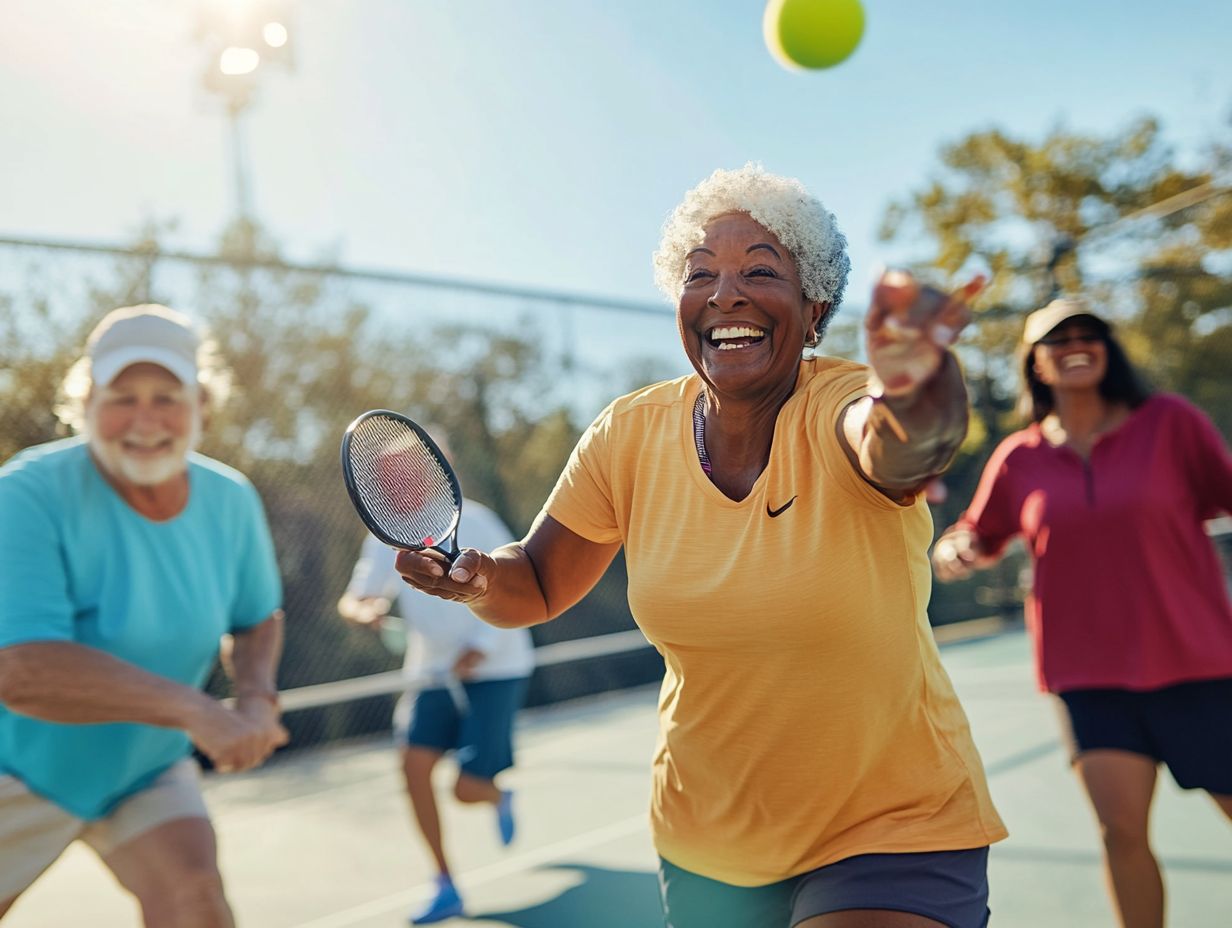
Pickleball is a fun and engaging recreational sport that combines elements of tennis, badminton, and ping-pong, making it a popular choice for people of all ages. Originally created in the mid-1960s, this easy-to-learn game has gained immense popularity as a means of fostering family togetherness, community bonding, and promoting healthy lifestyles.
Due to its low-impact nature, pickleball is an ideal way for individuals to incorporate physical activity into their daily routines while also encouraging socialization and teamwork. As players of varying skill levels compete on the courts, they discover the accessibility of pickleball, which allows for friendly competition and camaraderie.
It is not just the fast-paced action that attracts players; the straightforward rules make the game easy for beginners to grasp while still presenting challenges for more competitive athletes. Many communities have invested in public courts to promote participation, and local individuals and businesses have organized tournaments and leagues to strengthen community ties.
A versatile sport suitable for family reunions, pickleball fosters laughter and an active lifestyle among friends and family members of all ages, truly embodying the spirit of health and enjoyment.
Physical Health Benefits of Pickleball
Playing pickleball offers several physical health benefits, including improvements in cardiovascular health, increased muscle strength, and enhanced flexibility.
As a low-impact sport, pickleball enables players to participate in fitness activities without placing excessive strain on their joints. This accessibility makes it suitable for individuals of various age groups, particularly seniors.
Additionally, pickleball helps build endurance and improve coordination, all while promoting active aging and enhancing quality of life.
Improving Cardiovascular Health
Pickleball offers significant benefits for cardiovascular health, as it provides a fun and engaging way to achieve regular exercise, thereby increasing heart rate and stamina. The game’s fast-paced nature enhances players’ endurance and energy, enabling them to play longer and more vigorously, which in turn supports their heart health.
Pickleball involves a variety of movements, including lateral movement, sprinting, and long rallies, all of which contribute to improved aerobic fitness. These activities place stress on the cardiovascular system, helping to enhance circulation and oxygen distribution throughout the body.
Moreover, the social aspect of pickleball fosters teamwork and bonding among players, making exercise more enjoyable and encouraging individuals to participate more frequently. By playing pickleball regularly, individuals can improve their overall fitness while simultaneously reducing the risk of cardiovascular disease, promoting lasting health benefits.
Strengthening Muscles and Bones
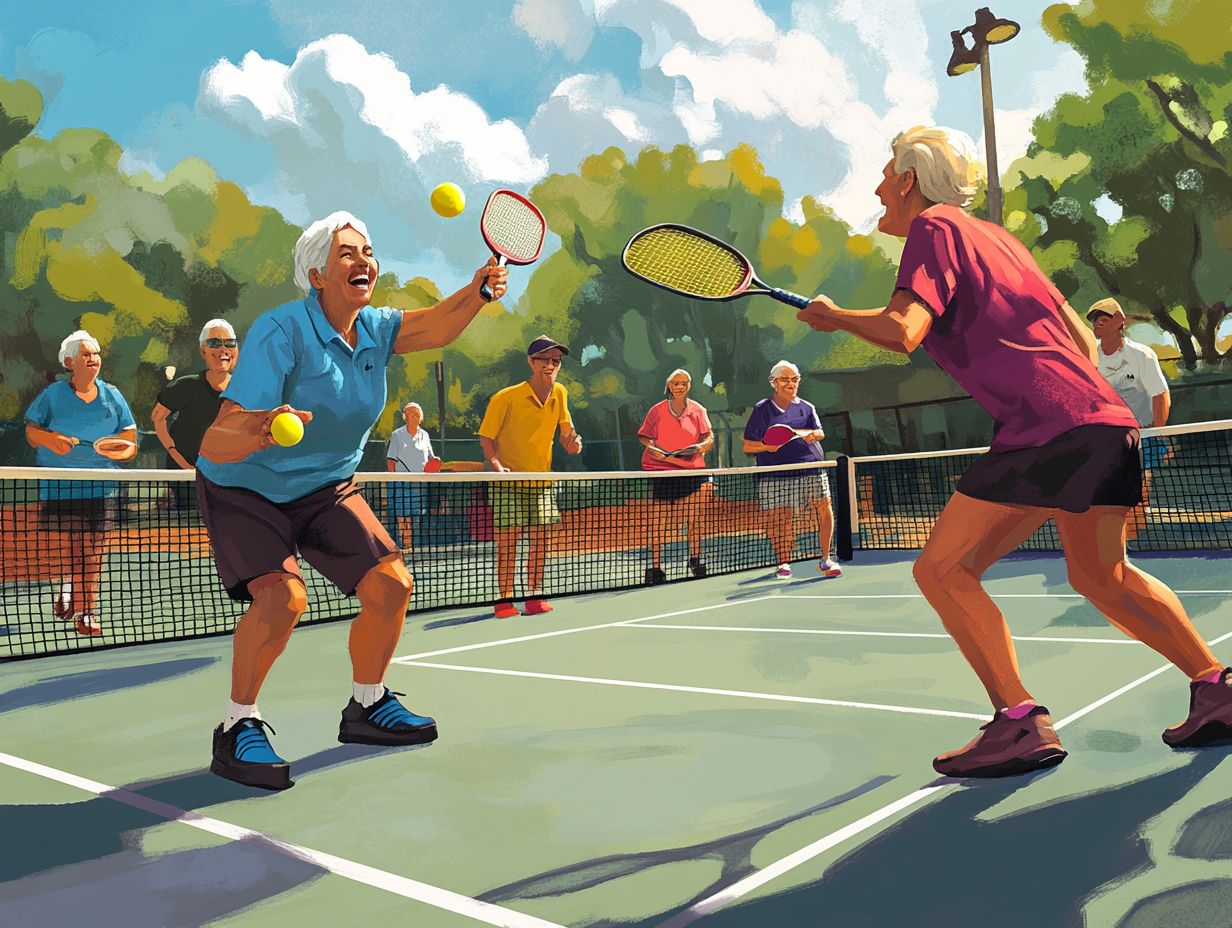
Pickleball effectively strengthens muscles and bones by promoting enjoyable, low-impact movements that enhance physical activity while minimizing the risk of injury. The game’s quick lateral movements and coordination requirements engage various muscle groups, thereby improving overall muscle strength and bone density.
As players pivot and reach for the ball, they enhance their agility and develop core stability, which is essential for balance and fall prevention. Each swing of the paddle demands strength and precision, effectively stimulating bone growth, particularly in weight-bearing areas.
Strength training is an important component of a regular exercise routine, as it complements the dynamic nature of pickleball by strengthening weaker muscle groups and creating a more balanced fitness program. By addressing potential imbalances and incorporating appropriate injury prevention techniques, players can enjoy the physical challenges of the game while reaping the long-term benefits of improved muscle and bone health.
Mental Health Benefits of Pickleball
Pickleball offers several benefits for mental health, including stress relief and enhanced cognitive function. These advantages make it a well-rounded form of exercise for participants.
The enjoyment derived from playing the sport helps to reduce anxiety, promotes mental agility, and fosters a sense of community among players.
Reducing Stress and Anxiety
Playing pickleball is an excellent way to relieve stress and anxiety, as the combination of physical activity and social interaction fosters a positive and uplifting atmosphere. The enjoyment of the sport, along with socializing with other players, cultivates a sense of belonging that helps alleviate everyday stress.
While pickleball is an effective way to stay fit, it also offers individuals the chance to build meaningful relationships with others who share similar interests. As players laugh, exchange tips, and compete on the court, they naturally develop friendships that extend beyond the game.
These connections create a positive and supportive network where players can motivate one another, celebrate successes, and work through life’s challenges together. Support networks like these are essential for improving mental health, as they enable players and help reduce the stressors of daily life.
Improving Cognitive Function
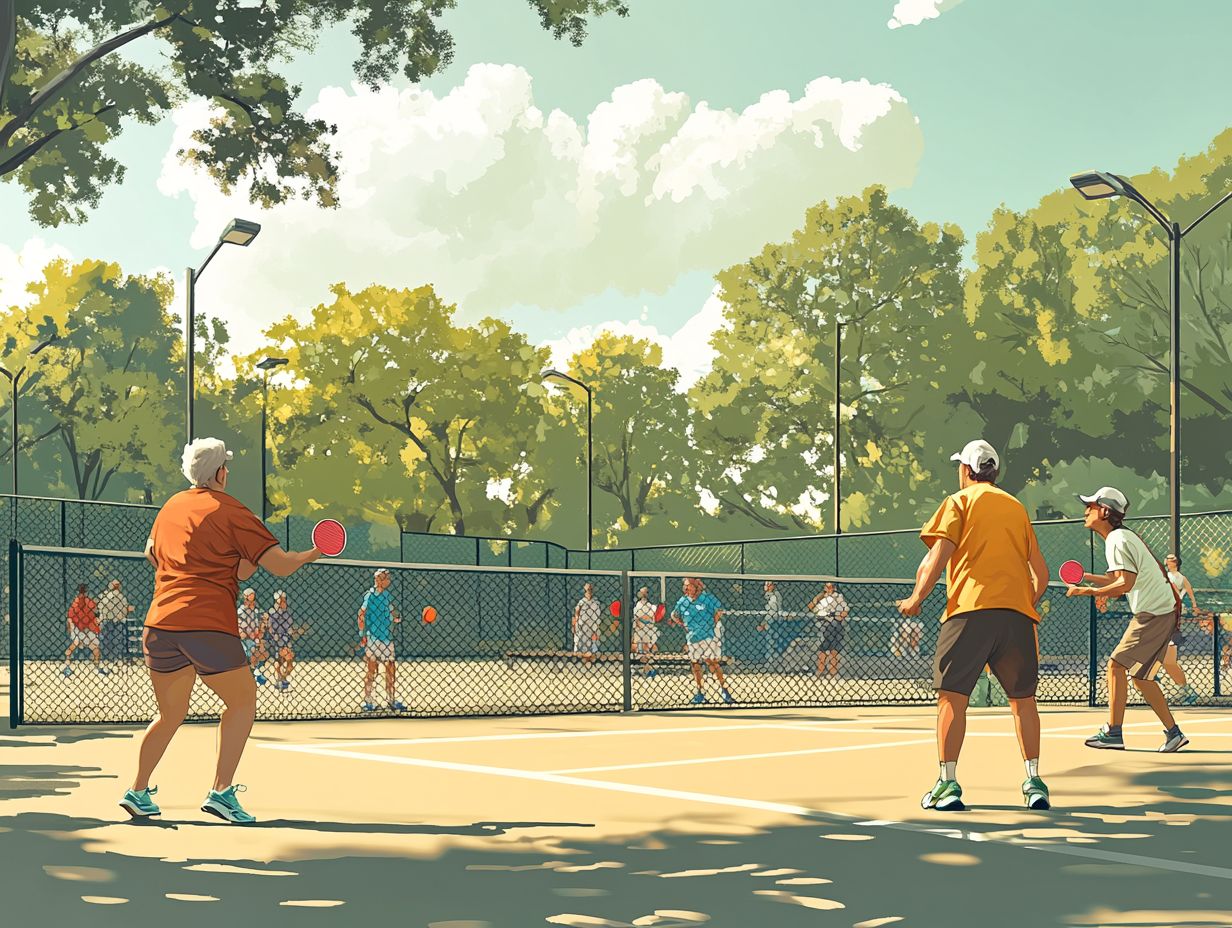
Playing pickleball enhances cognitive function by promoting strategic thinking, improving mental agility, and developing hand-eye coordination. The fast pace of the game encourages quick decision-making and teamwork, which positively affects brain health.
While engaging in this dynamic sport, individuals can sharpen their physical skills while also stimulating their minds. Each rally requires focus and the ability to anticipate the actions of other players, thereby enhancing problem-solving skills.
Additionally, the social aspect of the sport fosters improved communication skills and cognitive flexibility. This makes pickleball a unique activity that not only develops physical abilities but also helps maintain strong mental faculties throughout life, illustrating the beneficial impact of an active lifestyle on cognitive performance.
Social Benefits of Pickleball
Social Benefits: Pickleball promotes social interactions that enhance community engagement and create opportunities for teamwork and camaraderie. Its appeal across various backgrounds and age groups fosters inclusivity and social well-being through shared experiences and friendly competition.
Building Connections and Community
Pickleball fosters meaningful relationships and a sense of community, enhancing social skills and family bonds among players. Engaging in recreational activities together builds connections and creates an inclusive environment for all participants.
This fast-paced sport serves as an excellent platform for families to come together, engage in friendly competition, and create lasting memories. Whether it’s a casual match between family members or a larger community tournament, pickleball offers opportunities for players of all ages to interact, learn from one another, and celebrate both victories and defeats as a team.
Families develop teamwork and communication skills that extend beyond the court as they rally together. The inclusive nature of pickleball attracts a diverse range of groups, ensuring that everyone, regardless of their background, feels welcome and valued.
Promoting Inclusivity and Diversity
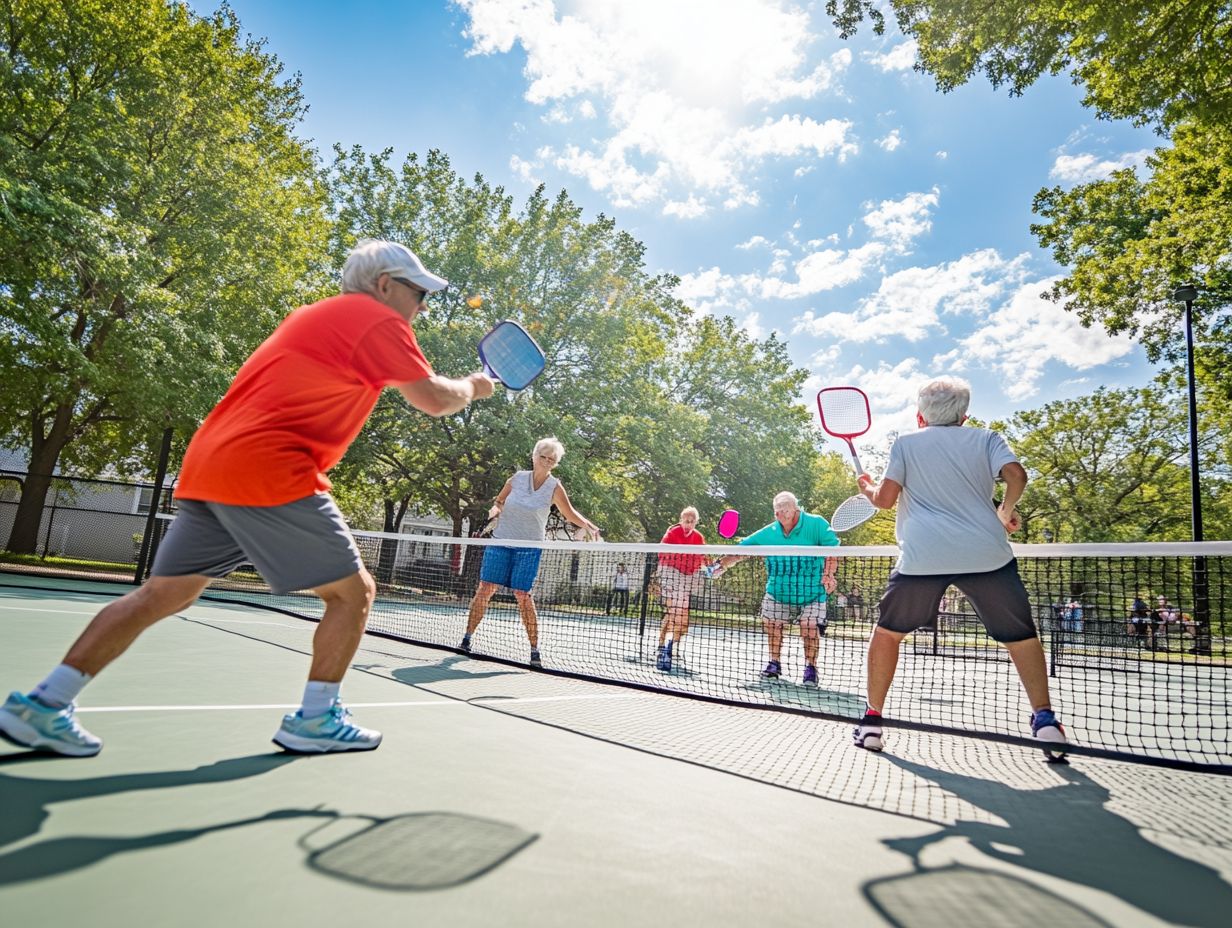
Pickleball is celebrated for its inclusiveness and diversity, appealing to individuals from various backgrounds and skill levels, which makes it a truly multi-generational sport. This commitment to inclusion enhances the social wellness of the sport by providing shared experiences in a friendly and welcoming environment.
The game’s simple rules and lightweight paddles make it accessible for people of all ages, from children to seniors, regardless of their social background. Additionally, the way pickleball is played encourages interaction among players, effectively breaking down barriers often seen in traditional sports.
The intergenerational aspect of pickleball fosters lasting friendships across age groups and cultures, bridging gaps and reminding players that everyone has something valuable to contribute both on and off the court. This sense of belonging not only aids in skill development but also promotes understanding among participants.
Pickleball for All Ages
Pickleball is a versatile sport that offers benefits for individuals of all ages, from youth to seniors, making it an ideal family activity that everyone can enjoy together.
Its inclusive nature encourages diverse age groups to participate in physical activity, which enhances fitness levels and promotes overall well-being.
Benefits for Children and Teens
Pickleball offers children and teens an exciting way to engage in physical activity while developing essential motor skills and coordination. This sport encourages teamwork, social skills, and healthy habits that can benefit young people well into adulthood.
As participants navigate the court, they enhance their hand-eye coordination and agility, both of which are crucial for overall physical development. Engaging in such a dynamic sport fosters a sense of achievement and boosts confidence, providing young players with a rewarding experience as they improve their skills.
Additionally, spending time on the court promotes a love for an active lifestyle, laying the groundwork for lifelong fitness and well-being. With its inclusive and adaptive nature, pickleball appeals to various skill levels, making it an ideal choice for youth who want to cultivate friendships while enjoying a fulfilling challenge.
Benefits for Adults and Seniors
The health benefits of pickleball for adults and seniors include enhanced mobility and active aging. Its low-impact nature, coupled with a reduced risk of injury and opportunities for social interaction, makes pickleball a popular choice for older individuals seeking to improve their health.
The game enhances cardiovascular fitness, benefiting both the heart and lungs. Additionally, improved balance and coordination gained from playing reduce the risk of falls. Increased strength and endurance can help seniors maintain their independence and perform daily activities more easily.
Furthermore, the social connections fostered through community play can help combat loneliness among senior citizens. Regular participation in pickleball can significantly enhance an older adult’s well-being and should be included in an active aging program.
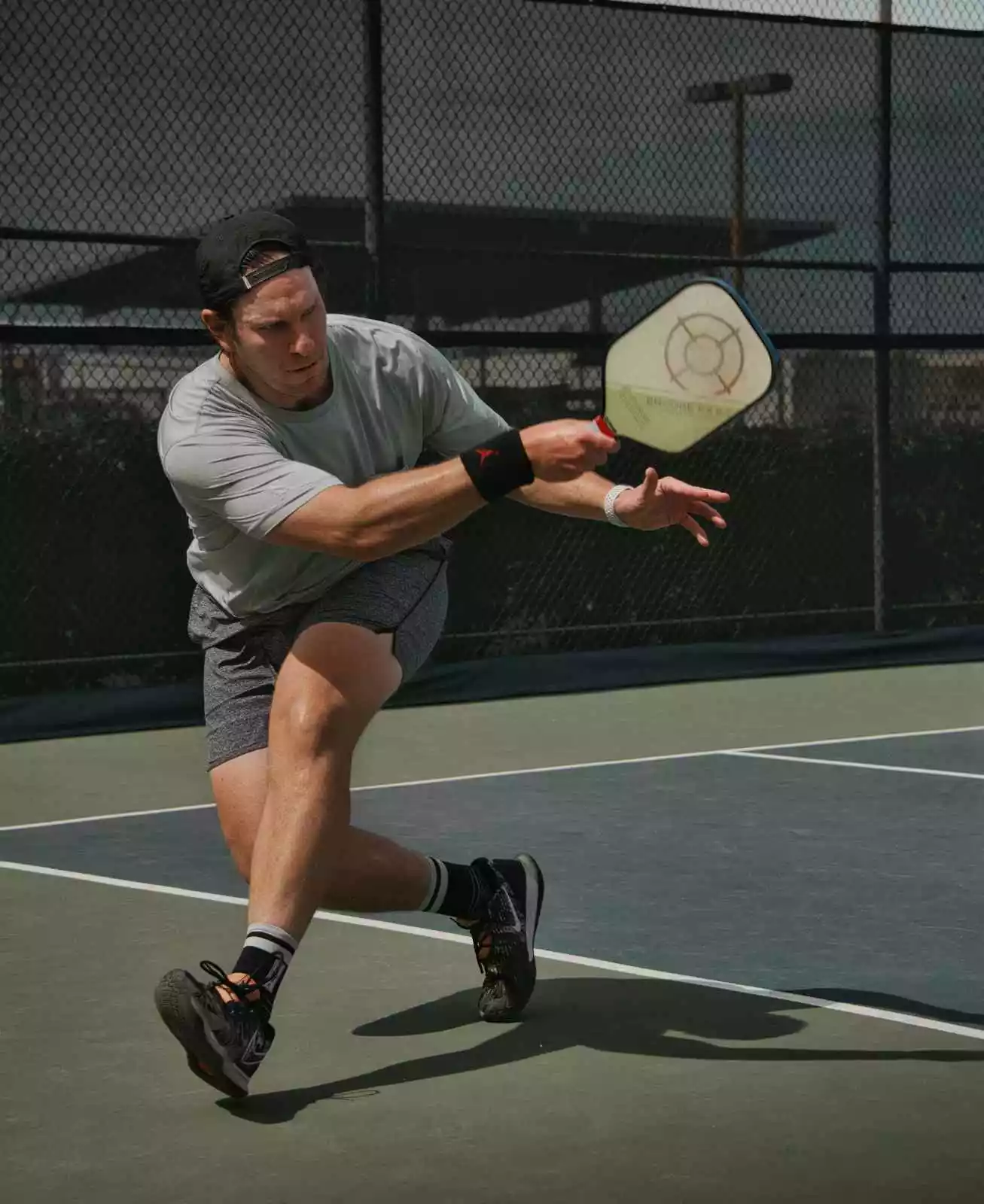
Pickleball’s more than a game to me—it’s a passion. I write, sharing its highs and lows, the thrills and the lessons. Some tales might draw you to the court, while others give a hint of the game’s magic. So, curious about my journey? Ready to dive deep into the world of pickleball with me? Let’s go.
